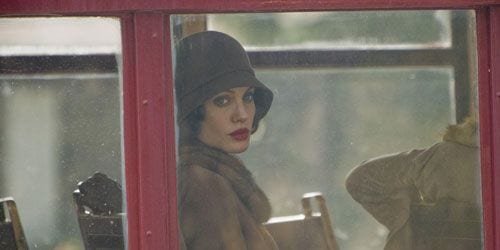
Trying to explain to nine-year-old Walter (Gattlin Griffith) why his father left them, Christine (Angelina Jolie) offers an awkward metaphor. On the day he was born, she says, “something else arrived in the mail.” The boy looks up at her, his face pale and eager and slightly worried. It was a box, she states, and in it was “something called responsibility,” Walter looks aptly confused. “He was afraid of what was in that box? That’s dumb!” Christine nods, her point made: “I thought so too,” she smiles.
On one hand, this brief exchange tells you something about the gentle, allusive, trusting relationship shared by mother and son. On another hand, it also reveals what’s weird and off-putting about Changeling, namely, its considerable self-regard. A movie made with awards season in mind, it offers extravagant affects and overwritten speeches. As Christine tells her too-clever, Reader’s Digest-y story, Jolie is just too awesome. Living in 1928 Los Angeles, her Christine is less a working mother (a phone company supervisor who spends her days on roller skates, efficiently solving her operators’ crises) than a period-appropriate movie star in incredible silk dresses and charming flapper hats, her red-red lipstick bright-leaping off the screen in her numerous close-ups. For his part, Walter is the era’s typically adorable movie kid, freckled, brown-suited, and solemn. When his mom has to leave him alone while she goes in to work on a Saturday, he doesn’t complain that she’s broken her promise to take him to the “new Charlie Chaplin film.” Instead, he sits quietly before the radio, determined to be good. “I’m not afraid of the dark,” he insists as she cautions she may be late. “I’m not afraid of anything.”
Alas, you know exactly where this is going — even if you don’t know the movie is loosely based on the notorious Wineville Chicken Murders. When Christine does arrive home later than she planned, Walter is vanished. Unable to rouse help from the police (who won’t let her even file a report until he’s been gone 24 hours), she sits alone in her parlor, tearful, camera craning out and up so as to isolate her perfectly in a grim halo of perfectly arranged lamplight.
Cut to the next morning, when police officers finally arrive to take a report. Standing on the sidewalk and observed by unhelpful neighbors, Christine’s story is turned much more complicated than it looks even at this plainly complicated moment. Walter is not just missing, as the authorities have insisted; he has been kidnapped by an especially horrific serial killer (who steals and chops up children with an axe out on his chicken ranch out in the desert). And Christine cannot just grieve her loss and lament LAPD failures, but she is transformed into a celebrity, an emblem of systems that must be changed and corruptions that must be righted. This role emerges five months after Walter disappears, when the extra-jaunty police captain J.J. Jones (Jeffrey Donovan) presents her with a boy they’ve found in DeKalb, Illinois. He is hers, Jones insists when the boy alights from the train, even as she knows he is not. Jones has brought along the press corps, better to bolster the department’s flagging reputation, and so he needs her to pose for a reunion photo and provide “the boys” with a quote, say, proclaiming herself the grateful mother. Unconvinced but compliant, Christine appears in the photo like a bad actress: tense, leaning toward and away from the un-Walter (Devon Conti) at the same time, unsure. For Jones, the photo documents her assent: she has taken the boy as hers. The case is solved.
The photo also marks a turning point for Christine (whose emotional careening is offset by the sad piano theme that follows her everywhere). Instantly regretting that she has taken the boy, she proceeds to discover just how unlike her son he is: he’s three inches shorter, he’s circumcised, the dentist swears to a difference in his teeth, and his schoolteacher promises to “eat my yardstick” if the boy is Walter. Nevertheless, Jones won’t accept a change in the case (“You’re trying to shirk your responsibility as a mother,” he hisses). When Christine goes to the newspapers with her story, Jones has her locked up in the county hospital’s psychopathic ward.
Here the film lurches into yet another melodramatic mode, wherein Christine is beaten and tied up, threatened with electric shock therapy (as suffered in close-up by her new best friend, carol [Amy Ryan]) and lobotomy (modeled by an ostentatiously scarred woman wheeled by in a chair). Now she’s fighting daily a contemptuous Dr. Steele (Denis O’Hare), who ensures that no matter how she speaks or behaves, she is labeled whatever is convenient for him. Like other Code 12s (patients committed because they’ve defied the police), Christine is offered a way out: sign a paper calling the cops right and absolving them of all legal liability.
Her refusal makes her heroic, of course, a point underlined by her ravaged face, revered by the film and also by the news photogs within the film. She’s further sensationalized by a local activist, Reverend Gustav Briegleb (John Malkovich), who uses his radio show to excoriate the “most violent, corrupt, and incompetent police department this side of the Rocky Mountains,” headed by sinister, self-promoting Chief James E. “Two Guns” Davis (Colm Feore), Briegleb takes up Christine’s case, marching around the city, storming the hospital doors, and bringing in a mucky-muck lawyer to sue the city on Christine’s behalf. Her case — all histrionic pronouncements by lawyers — is intercut with that of the child-killer, an insidious, whiny caricature captured at last by Detective Lester Ybarra (Michael Kelly), determined to do his job rather than follow Jones’ orders. With good guys and bad guys so broadly drawn, Christine — so glamorous, so dramatic, so camera-ready — looks almost subtle by comparison.

![Call for Papers: All Things Reconsidered [MUSIC] May-August 2024](https://www.popmatters.com/wp-content/uploads/2024/04/all-things-reconsidered-call-music-may-2024-720x380.jpg)



